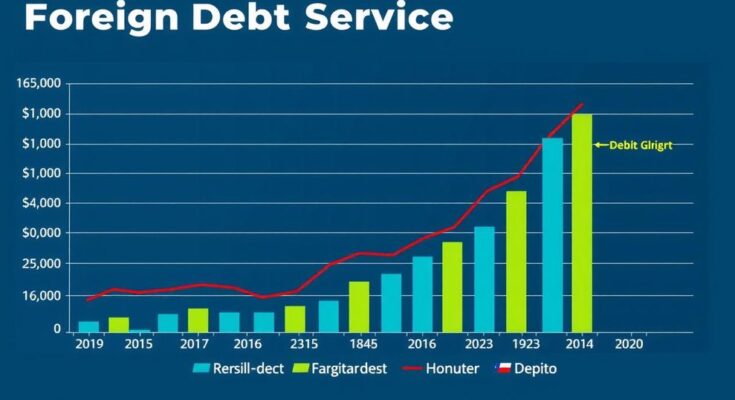The CBN reports Nigeria’s foreign debt service reached $5.47 billion from Jan 2024 to Feb 2025. Meanwhile, foreign exchange remittances increased by 1.3% YoY to $180.03 million in early 2025, indicating potential recovery amidst fluctuating debt service payments and pressures on the country’s fiscal stability.
The Central Bank of Nigeria (CBN) has revealed that the country spent approximately $5.47 billion on foreign debt servicing between January 2024 and February 2025. This situation underscores the escalating challenges faced by Nigeria in managing its revenues, external reserves, and overall fiscal stability.
In recent data, the CBN noted that foreign exchange direct remittances experienced a Year-on-Year increase of 1.3% to $180.03 million during the first two months of 2025. This growth showcases a promising trend after total remittances in 2024 amounted to $1.91 billion, reflecting a 3.5% decline from the previous year.
The report from the CBN indicated a significant monthly fluctuation in debt service payments, with the highest recorded outflow of $854.37 million in May 2024, contrasted by a stark decline to $50.82 million in June 2024. The data also revealed a quarter-on-quarter increase in debt service costs for Q3 2024, totaling approximately N3.57 trillion.
Further analyses show that debt service obligations fluctuated considerably throughout the review period, demonstrating substantial increases and decreases month-to-month. For instance, payments surged by 967.4% to $542.50 million in July following the low in June. Similarly, the fluctuations impacted foreign exchange reserves, stressing the need for prudent fiscal management.
Amid these developments, the CBN’s efforts to reform the currency market are reflected in the recovering remittance inflows early in 2025. Notably, February remittances surged to $125.59 million, signifying a 220.8% increase from the same month in the prior year, suggesting that reforms may be positively influencing remittance behavior.
In summary, the CBN’s report highlights critical insights into Nigeria’s foreign debt service expenses and foreign exchange remittance trends. The substantial amount spent on foreign debt servicing indicates pressures on the nation’s fiscal health, while the recent increases in remittance inflows may signal recovering financial stability. The mixed performance of debt servicing requirements further emphasizes the need for effective fiscal policies to stabilize the economy.
Original Source: www.arise.tv




